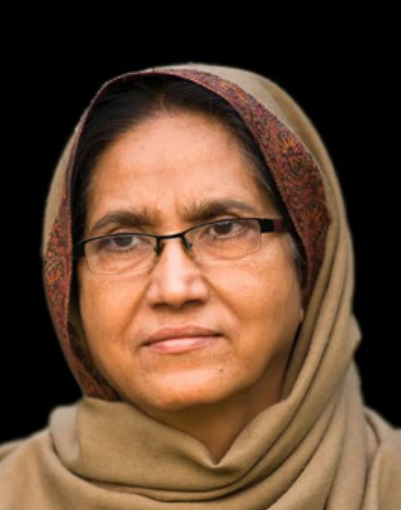FROM THE EDITOR-IN-CHIEF’S DESk
 Prof Farida Khanam is an author, editor, translator, public speaker and former professor of Islamic Studies at Jamia Millia Islamia, New Delhi. Among her books are ‘A Simple Guide to Islam’ and ‘A Study of World’s Major Religions’. She has translated into English many books authored by Maulana Wahiduddin Khan. Currently the chairperson of CPS International, she is a regular contributor of articles to various publications. Prof Khanam has edited Maulana’s English translation of the Quran and has also translated his Urdu commentary on the Quran into English. She can be reached at [email protected]
Prof Farida Khanam is an author, editor, translator, public speaker and former professor of Islamic Studies at Jamia Millia Islamia, New Delhi. Among her books are ‘A Simple Guide to Islam’ and ‘A Study of World’s Major Religions’. She has translated into English many books authored by Maulana Wahiduddin Khan. Currently the chairperson of CPS International, she is a regular contributor of articles to various publications. Prof Khanam has edited Maulana’s English translation of the Quran and has also translated his Urdu commentary on the Quran into English. She can be reached at [email protected]
STEPS TOWARDS SHARED GLOBAL PROSPERITY
In accordance with the Common Era (CE) calendar, the commencement of a new year occurs on January 1st, and consequently, New Year’s Day is universally celebrated on this date across the world. The observance of New Year’s Day is marked by a collective hope that the forthcoming year will surpass its predecessor. However, this aspiration can be realized only by individuals who maintain a meticulous account of their actions and choices, as opposed to those who lead lives characterized by negligence and complacency.
The world today is at a critical crossroads, grappling with complex challenges such as the ongoing Ukraine-Russia and Palestine-Israel conflicts. These turbulent times call for a renewed commitment to global peace and unity. The United States, with its historical and geopolitical influence, has a unique opportunity to lead global efforts towards peace, cooperation, and shared prosperity. Effective leadership in this era demands not only the exercise of power but also empathy, respect, and a genuine willingness to understand and incorporate diverse perspectives.
Historically, the United States has played a pivotal role in fostering peace and stability. Initiatives such as the Marshall Plan and the formation of the United Nations highlight America’s contributions to global recovery and cooperation. However, the complexities of modern conflicts require a departure from traditional power- centric approaches. Prioritizing diplomacy, dialogue, and multilateral collaboration can enable the U.S. to address the root causes of conflict, promoting peaceful resolutions rather than exacerbating tensions.
During Donald Trump’s presidency, the Abraham Accords marked a significant step towards reconciliation in the Middle East, fostering peaceful relations between Israel and several Arab nations. As Trump assumes office as the 47th President, there is hope that similar initiatives prioritizing peace and dialogue will be at the forefront of U.S. foreign policy. Such agreements demonstrate the potential for innovative diplomatic frameworks to achieve tangible progress, even in historically contentious regions.
The teachings of revered spiritual figures underscore the universal value of peace and compassion. Jesus Christ’s exhortation to “love your neighbour” (Matthew 22: 39) and the Prophet Muhammad’s emphasis on spreading peace, “It is part of faith to spread peace to all of humanity”, (Musnad al-Bazzar) offer timeless principles that resonate in today’s interconnected world. Similarly, the Quranic guidance that “reconciliation is best” (4:128) provides a foundation for addressing conflicts with mutual understanding. These universal values can inspire a foreign policy that transcends cultural and religious differences, focusing on shared human aspirations.
America’s leadership should aim to facilitate conversations and provide support without imposing its own beliefs or ideologies. Respecting each nation’s sovereignty and values fosters trust and lays the groundwork for productive collaborations. By engaging in multilateral diplomacy and building coalitions around shared interests—such as economic stability, global public health, and environmental sustainability—the U.S. can act as a unifying force in the international arena.
The founding principles of the United States, rooted in freedom, equality, and self-governance, serve as a timeless reminder of the nation’s potential to inspire others. A foreign policy guided by compassion, cooperation, and mutual respect would align with these principles, setting a new standard for global leadership. Such an approach would not only address immediate crises but also contribute to a more stable and just international order.
Citizens play a vital role in advocating for peace and influencing their leaders to prioritize diplomacy over conflict. In an interconnected world, public opinion has unprecedented power to shape policy decisions. Social movements and digital activism provide platforms for individuals to amplify messages of unity and compassion, urging governments to pursue harmonious international relations.
To establish itself as a beacon of stability and shared prosperity, the United States can adopt several practical measures:
- Strengthening International Institutions: Support for the United Nations, World Health Organization, and other global bodies can enhance collective problem-solving capabilities.
- Investing in Development: Promoting education, healthcare, and infrastructure in developing nations can address the root causes of instability.
- Encouraging Regional Cooperation: Facilitating dialogues among regional stakeholders can prevent conflicts and promote local solutions.
- Promoting Trade and Economic Partnerships: Economic interdepend- ence fosters collaboration and reduces incentives for conflict.
The United States stands at a pivotal juncture, with the potential to redefine its role in the world. By embracing principles of empathy, mutual respect, and genuine dialogue, America can lead the way in building a future characterized by global cooperation and shared prosperity. In doing so, it has the chance to leave a legacy of unity, inspiring hope and creating a world where peace becomes a common goal for all nations.
By taking these steps, the United States can set an enduring example of peace-driven leadership, demonstrating that true strength lies not in domination but in the ability to unite humanity around shared ideals and aspirations.
(This article appeared in the Speaking Tree column of the Times of India dated November 9, 2024.)





